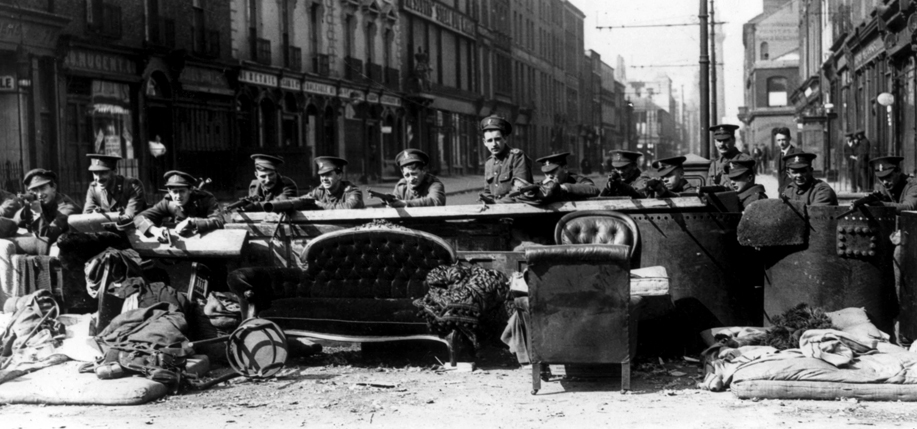A number of albums released this year and last have has strong thematic links to the Easter Rising.
Rising
Black Bank Folk
A debut album years the making, Rising, tells the human stories of historic heroes, an idea inspired by musician John Colbert’s personal connection to the rebellion through his great uncle, Con Colbert, one of the executed leaders of the Rising. John and fellow musician James Sheeran explore the emotions of love, fear, courage and admiration amid the immediacy of a changing world.
Several standouts of the album include “Brother,” a song of Willie Pearse’s devotion to older brother Padraig. Willie learns about love and sacrifice from Padraig’s early efforts to preserve their beloved country, never leaves his side during the fighting, and, although he never held a gun, is executed along with his brother for his involvement, praying their mother will understand. “Lullaby,” featuring guest vocalist Grace O’Malley, is a heartbreakingly lovely duet evoking the last moments of Joseph Plunkett and Grace Gifford before his impending morning execution. A dramatic cover of Luke Kelly’s “Sons of Roisin” features the group as musical backdrop to Kelly’s reading.
Having grown up together, both becoming accomplished musicians with a stellar debut, Rising will hopefully not be the last collaboration of Colbert and Sheeran.
Visionaries – 1916
Lorcán Mac Mathúna with Elaine O’Dea, Íde Mac Mathúna, Daire Bracken, Martin Tourish, and Éamonn Galldubh
From an inspiring concept – setting to music the words of poets Pearse, Plunkett, and Connolly while paying homage to the musicianship of Ceannt – renowned sean-nós singer and composer Lorcán Mac Mathúna has created a remarkable album that reveals the everyday passions of these revolutionary heroes of 1916. Mac Mathúna initially composed the music for the Arts Council Centenary program, “1916 – Visionaries and Their Words,” and teamed with long-term collaborators Martin Tourish and Daire Bracken for the recording.
Two of Pearse’s poems, “Fornocht do chonac thú” and “Óró Sé do Bheatha a‘Bhaile” are movingly sung in Irish, the first to a simple melody with minimal accompaniment of fiddle, flute, and accordion and the second to the familiar Jacobian air to which Pearse first set his poem.
Included in this collection, too, are Plunkett’s “Clouds” and “White Dove of the Wild Dark Eyes,” both thoughtful and contemplative performances in voice, fiddle, and pipes. James Connolly’s, “We Only Want the Earth,” is rendered here as a rousing ballad, lifted by a lively melody and inspiring chorus.
A trio of tunes featuring uilleann pipes pays tribute to Éamonn Ceannt, beginning with “Ceol an Phíobaire” (the “music of the piper”), followed by jigs “Cnocan an Teampel” and “The Gold Ring.”
This album is a gift to those who love Ireland’s history, literature, and traditional music.
The Girl with the Beret
Kate O’Callaghan
Singer, songwriter, and artist from Donegal Kate O’Callaghan draws inspiration for this concept mini-album from the witness statement of her great-great aunt, Catherine Rooney, as recorded with the Bureau of Military History. The album moves from the spoken words of this statement into the songs they inspire, bringing to life the courage of a young girl during the Easter Rising.
The first track, “The Fight is On,” opens with the sound of morse code, the delivery method of the first news broadcast of the Rising, and Catherine’s words describing the scene on O’Connell Street and how she kicked in the side window of the Post Office to get inside. This leads into “Rising Men Down” where we hear the sweet yet strong voice of Catherine’s great-grandniece singing this story, further interpreting what Catherine saw, heard, and felt.
One of the most poignant parings is “Safe Passage” into “Lay,” in which we learn of Catherine’s dangerous messenger work, running through gunfire and burning streets, remembering the kindness of those who promised safe passage and gave her rest. A haunting, simple melody with beautiful lyrics, made all the more so by knowing the story is real.
Kate O’Callaghan pays a great tribute to her aunt in this small but powerful collection, tinged with sadness, admiration, and love.
No Force On Earth
Damien Dempsey
For No Force On Earth, Damien Dempsey pulls women, Irish travelers, the English aristocracy, and those beyond Ireland’s boarders together, emphasizing the diverse power and spirit of the people involved in Ireland’s struggle for freedom. His own voice gives power to the rebel standards “Banna Strand” and “James Connolly,” and he sets to music Yeats’s “The Death of Cuchulain,” juxtaposing Ireland’s mythical and contemporary warriors.
Dempsey’s personal connection to the Rising comes to the surface in “Aunt Jennie,” a tribute to his great-aunt Jennie Shanahan, who fought under Sean Connolly in Dublin City Hall and in the end held the dying Connolly in her arms as she whispered the Act of Contrition in his ear. Other original songs include “Paddy Ward,” the true story of an Irish traveler who fought in 1916, the War of Independence, and the Civil War, only to be murdered by a landlord who got off too lightly. “Wave Hill Walk Off” tells the story and struggle of the Australian aboriginal land rights movement of 1966, written in solidarity with the Rising’s commemorative year.
Damien’s passion in both voice and lyrics is compelling; he delivers No Force on Earth forcefully and straight-forwardly, with minimal accompaniment – an ideal choice for this message. ♦


Leave a Reply